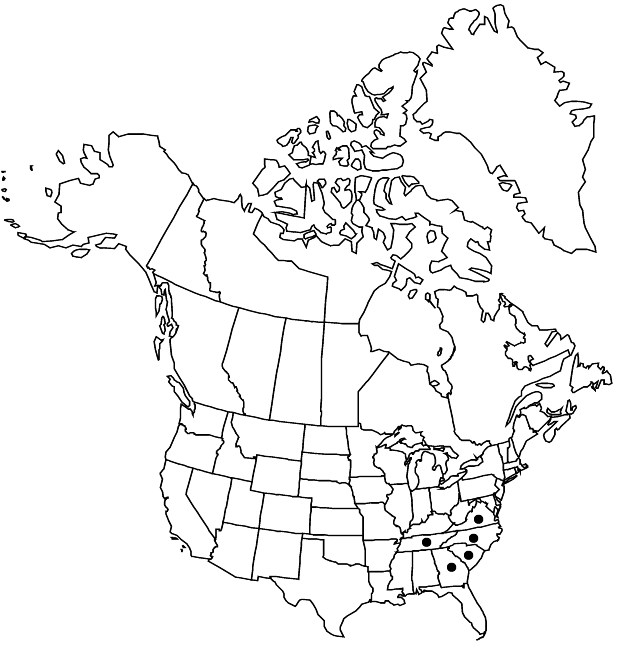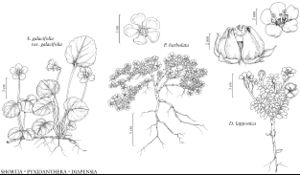Shortia galacifolia var. galacifolia
Common names: Southern shortia
Revision as of 12:08, 30 July 2020 by imported>Volume Importer
Flowers: corolla lobes 16–25 mm; styles (10–) 12–18 mm. 2n = 12.
Phenology: Flowering Mar–Apr.
Habitat: Moist slopes and ravines, stream banks, rock outcrops and cliffs, rich hardwoods, commonly under hemlock (Tsuga canadensis), white pine (Pinus strobus), or tulip poplar (Liriodendron tulipifera), Rhododendron maximum, R. minus, and Kalmialatifolia
Elevation: 200-700 m
Distribution

Ga., N.C., S.C., Tenn., Va.
Discussion
Variety galacifolia is native in humid gorges of the Blue Ridge escarpment in Jackson and Transylvania counties, North Carolina; Oconee and Pickens counties, South Carolina; and Rabun County, Georgia. The type locality and nearby populations, probably as much as 60% of the entire species, were destroyed by the construction of Lake Jocassee (South Carolina) in the early 1960s. Adventive populations of var. galacifolia apparently have been naturalized or at least persist from cultivation in Tennessee and Virginia and farther north in North Carolina.
of conservation concern
Selected References
None.
Lower Taxa
None.
... more about "Shortia galacifolia var. galacifolia"
hypogynous +
dehiscent +
emarginate;truncate +
rounded;cordate +
orbiculate;elliptic-orbiculate ovate-oblong or ovate +
3;5 +
Southern shortia +
campanulate +
straight;curved +
copious +
fleshy +
adnate +
spreading;slightly nodding +
bisexual +
capsular +
loculicidal +
dense +
Moist slopes and ravines, stream banks, rock outcrops and cliffs, rich hardwoods, commonly under hemlock (Tsuga canadensis), white pine (Pinus strobus), or tulip poplar (Liriodendron tulipifera), Rhododendron maximum, R. minus, and Kalmialatifolia +
Present +
simple +
rosulate +
basal +
crenate-serrate +
obtusely toothed;laciniate or fringed +
axile +
superior +
axile +
hypogynous +
connate +
absent +
3-carpellate +
Amer. J. Sci. Arts +
scale-leaved +
slender +
lignescent +
bracteate +
elongating +
brown +
10;30 +
cylindric +
distinct +
alternating +
connate +
absent +
unbranched +
erect +
mycorrhizal +
capitate +
slightly 3-lobed;unlobed +
absent +
terminal +
veined +
glabrous +
Shortia galacifolia var. galacifolia +
Shortia galacifolia +
variety +
